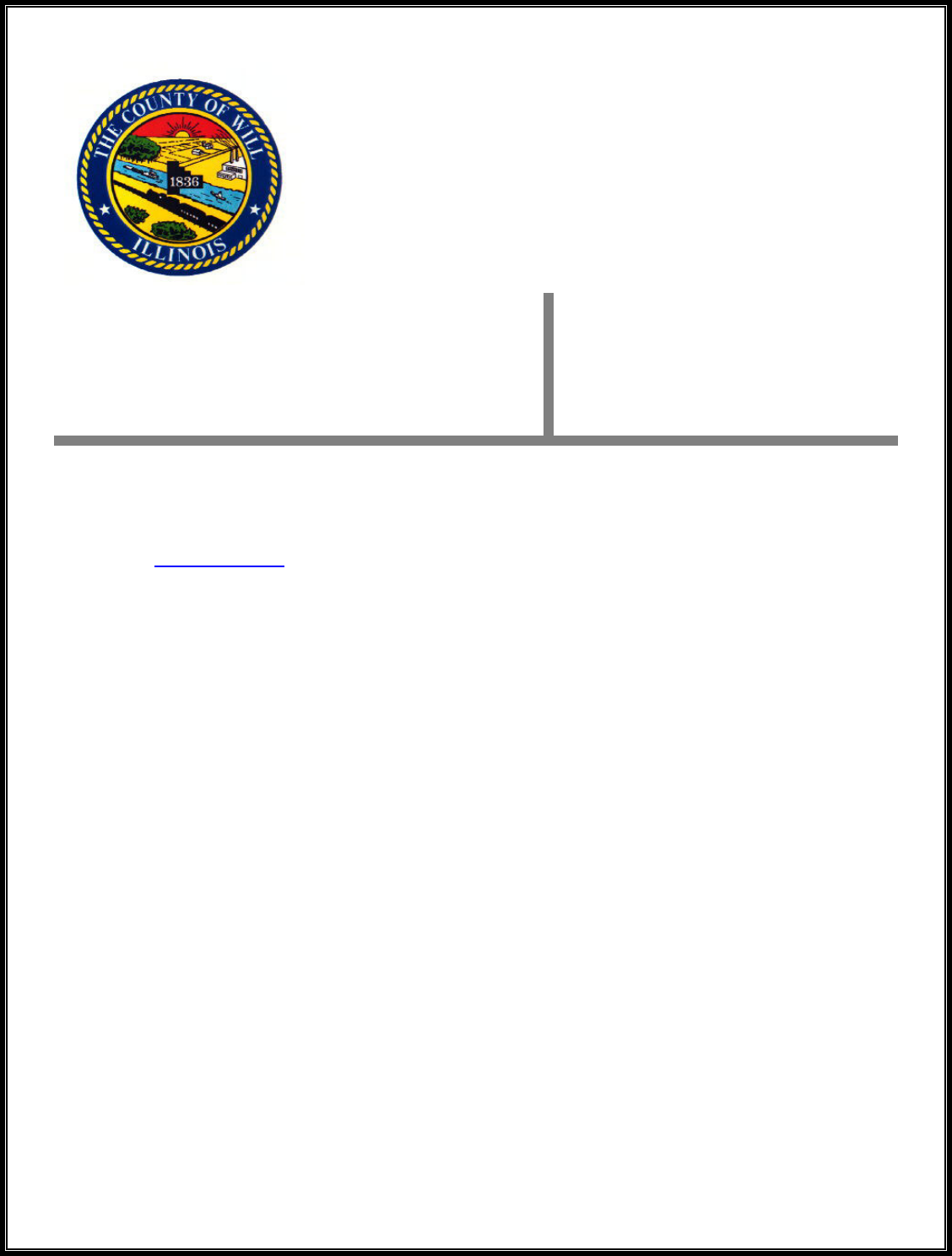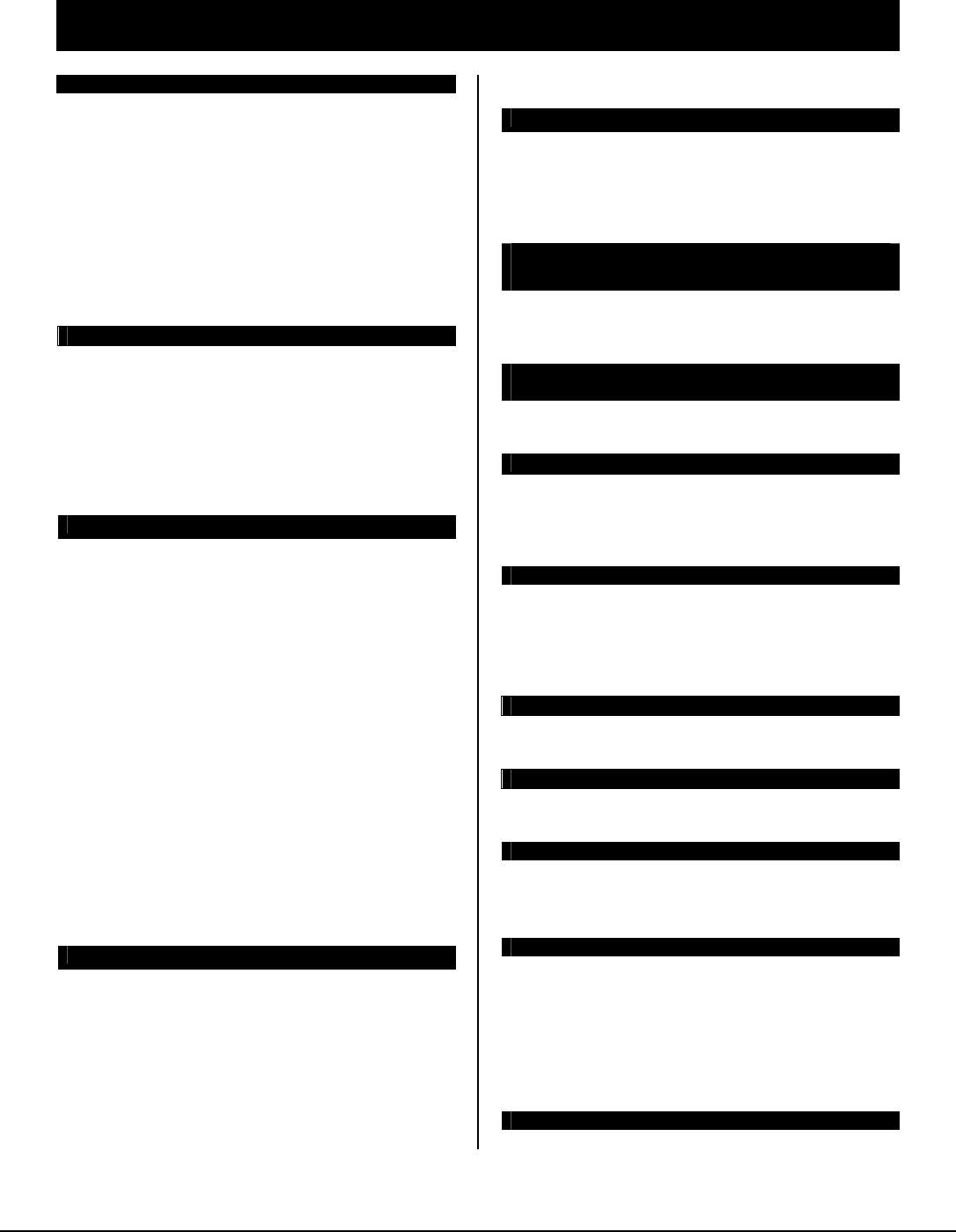
Will
County
Board of Review
2021
The Will County Board of Review has adopted these
rules and procedures “for the guidance of persons doing
business with them and for the orderly dispatch of
business” (35 ILCS 200/9-5). Questions may be directed
to the Board of Review office at (815) 740-4707.
Rules and
Procedures
Susan McMillin, CIAO/I, Member
Sharon L. Morelli, CIAO, Member
Sue L. Smith, CIAO, Member
Rhonda R. Novak, CIAO/I, Clerk

Township Assessor Contact Information
2021 Rules and Procedures 2
In Will County, all initial assessed valuations are developed at the Township level, not the County level.
Taxpayers are strongly encouraged to discuss their real estate assessments with the Township
Assessor prior to the filing of a complaint with the Board. Many times the reason for the assessment
can be made clear or any errors in the property record card can be corrected, eliminating the need for
filing a complaint. After talking with the Township Assessor, taxpayers still wishing to pursue an
assessment complaint will need to familiarize themselves with the following rules governing hearings
before the Board. By state law, the time period for filing a complaint cannot be extended while
discussing the assessment with the Township Assessor.
Channahon
Ann Crickman
PO Box 456
Channahon, IL 60410
815-476-2831
Crete
Mary Tamez
1367 Wood St.
Crete, IL 60417
708-672-8291
www.cretetownship.com
Custer
Pamela Hall
36005 Ohlhules Rd.
Custer Park, IL 60481
815-458-2252
DuPage
Jean Kelly
241 Canterbury Ln.
Bolingbrook, IL 60440
630-759-1315
www.dupagetownshipassessor.com
Frankfort
Joe Kral
11000 W. Lincoln Highway
Frankfort, IL 60423
815-464-3180
www.frankfortassessor.com
Green Garden
Jane Bushong
PO Box 571
Monee, IL 60449
708-607-0006
https://www.toi.org./township/will-county-
green-garden-township
Homer
Karen Szynkowski
14350 W. 151
st
St.
Homer Glen, IL 60491
708-301-8166
www.homerassessor.org
Jackson
Delilah LeGrett
100 E. Mississippi St.
PO Box 411
Elwood, IL 60421
815-423-5780
Joliet
Jim Brenczewski
175 W. Jefferson St.
Joliet, IL 60432
815-726-5446
www.jolietassessor.net
Lockport
Maryann Williamson
1463 Farrell Rd
Lockport, IL 60441
815-838-0780
www.lockporttownship.com
Manhattan
Joe R. Oldani
230 Wabash
Manhattan, IL 60442
815-478-5154
www.manhattantownship.com
Monee
Sandra Heard
46 Towncenter Rd
University Park, IL 60484
708-534-6023
www.moneeassessor.com
New Lenox
Bonnie Luckhart Hernandez
1100 S. Cedar Rd.
New Lenox, IL 60451
815-485-9419
www.newlenox.org
Peotone
Patricia Latham
8212 W. Kennedy Rd.
Peotone, IL 60468
708-258-9192
Plainfield
Erin Kljaich
22525 W. Lockport St.
Plainfield, IL 60544
815-436-5110
www.plainfieldassessor.com
Reed
Melanie Noramczyk
440 N. Division St.
Braidwood, IL 60408
815-458-6068
Troy
Kim Anderson
25448 Seil Rd.
Shorewood, IL 60404
815-744-5806 & 815- 744-
5807
www.troytownship.com
Washington
Mary Tamez
30200 Towncenter Dr.
Beecher, IL 60401
708-231-1175
www.washingtontownshipil.com
Wesley
Ann Crickman
21333 W. Ballou Rd.
Wilmington, IL 60481
815-476-7869
Wheatland
Charles Kern
4232 Tower Court
Naperville, IL 60564
630-717-0092
www.wheatlandassessor.com
Will
Helen Heisner
30317 S. Will Center Rd.
Peotone, IL 60468
708-258-6774
Wilmington
Carlotta Marchese
120 N Main St./ PO Box 397
Wilmington, IL 60481
815-476-7255
Wilton/Florence
Will County
302 N. Chicago St.
Joliet, IL 60432
815-740-4702
www.willcountysoa.com

Table of Contents
2021 Rules and Procedures 3
Administrative Rules
Convening the Board ....................................................... 4
Severability ..................................................................... 4
Amendments ................................................................... 4
Retroactivity ................................................................... 4
Date of Filing ................................................................... 4
Forms .............................................................................. 4
Ex Parte Communications ................................................ 4
Failure to Follow Board Rules .......................................... 5
Freedom of Information Act Policy .................................. 5
Ethics Policy..................................................................... 5
Dress Code…………………………………………………………………..5
Meetings
Location .......................................................................... 5
Open Meetings ................................................................ 5
No Rescheduling .............................................................. 6
Improper Conduct or Language ...................................... 6
Conduct of Meetings and Hearings .................................. 6
Hearings………………………………………………………………………..6
Non-Appearance at Hearings
Scheduled at Taxpayer Request .................................... 6
Assessment Complaints
─
General Procedures
Consultation with Township Assessor .............................. 6
Basis for the Assessment Complaint ................................ 7
Standing to File a Complaint ............................................ 7
Reductions in Excess of $100,000 ..................................... 7
Insufficient Complaint Forms……………………………………..….8
Incomplete Complaint Forms ........................................... 8
Facsimiles ........................................................................ 8
Contiguous Parcels .......................................................... 8
Excess Land ..................................................................... 8
Properties with Multiple Parcel Numbers ........................ 8
Filing Deadline ................................................................ 9
Submission of Evidence ................................................... 9
Disclosure of Recent Sale Required .................................. 9
Evidence Submission by Township Assessors
and Taxing Bodies ................................................... 10
Hearing Officers ............................................................ 10
Hearing Notification ...................................................... 10
Hearing Format ............................................................. 10
Hearing Length .............................................................. 11
Decision Notification ..................................................... 11
Assessment Complaints Based upon
Overvaluation
Definition ...................................................................... 11
Burden of Proof ............................................................. 11
Evidence Considered ...................................................... 12
Comparable Properties .................................................. 12
Use of Short/Post-Foreclosure Sales as Evidence ........... 12
Use of Relocation Sales as Evidence ............................... 12
Appraisal Evidence ........................................................ 12
Other Evidence .............................................................. 13
Disclosure of Rental Data Required ............................... 14
Occupancy ..................................................................... 14
Assessment Complaints Based upon Equity
Definition ...................................................................... 14
Burden of Proof ............................................................. 14
Evidence Considered ...................................................... 14
Comparable Properties .................................................. 14
Disclosure of Rental Data Required ............................... 15
Assessment Complaints Based upon
Discrepancy in
Physical Data
Definition ...................................................................... 15
Evidence ........................................................................ 15
Assessor Access to Property ........................................... 15
Assessment Complaints Based upon
Preferential Assessment
Definition ...................................................................... 15
Evidence ........................................................................ 15
Corrections
Definition ...................................................................... 16
Deadline ........................................................................ 16
Notice ........................................................................... 16
Evidence ........................................................................ 16
Certificates of Error
Definition ...................................................................... 16
Submission .................................................................... 16
Evidence ........................................................................ 16
Limitations on Authority ................................................ 16
Deadline ........................................................................ 17
Omitted Property
Authority ....................................................................... 17
Notice ........................................................................... 17
Equalization
Authority ....................................................................... 17
Procedure ...................................................................... 17
Homestead Exemption
Applications .................................................................. 18
Notarization .................................................................. 18
Approval or Denial ........................................................ 18
Non Homestead Exemptions
Applications .................................................................. 18
Separate Applications………………………………………………….18
Submission in Duplicate ................................................. 18
Affidavit of Use ............................................................. 18
Photographs .................................................................. 18
Notarization .................................................................. 18
Notification of Units of Government .............................. 18
Adoption
Adoption ....................................................................... 18

Rules and Procedures
2021 Rules and Procedures 4
The Illinois Property Tax Code requires that valuations for the 2021 assessment year shall be
made as of January 1, 2021 (See 35 ILCS 200/9-155, et seq.). It also requires that the
assessments reflect one-third of the fair cash value of property, as determined by sales from
2018, 2019, and 2020 (See 35 ILCS 200/1-55). Any party presenting valuation evidence from
sales prior to January 1, 2018 or after January 1, 2021 has the burden of proof of establishing
why such evidence best represents the valuation period in question and should be considered
by the Board of Review.
A. Administrative Rules
1. Convening the Board. The Board will convene on or before the First Monday of June
and will recess from day to day as may be necessary.
2. Severability. In the event any section, provision, or term of this policy is determined by
a court or other authority of competent jurisdiction to be invalid, that determination
shall not affect the remaining sections or provisions, which shall continue in full force
and effect. For this purpose, the provisions of this policy are severable.
3. Amendments. These rules may be amended from time to time; amendments are
effective upon their being conspicuously posted and prominently displayed by the Clerk
of the Board.
4. Retroactivity. A Board complaint decision resulting in a change of assessed value will be
effective for only the current assessment year; the Board does not have retroactive
power except with regard to omitted property and the process of stipulation of assessed
value on appeals which are currently before the Property Tax Appeal Board for prior tax
years.
5. Date of Filing. Complaints and other written correspondence sent by the United States
mail shall be considered filed as of the postmark date in accordance with Section 1.25 of
the Statute on Statutes. Complaints and other written correspondence sent by a
delivery service other than the United States Postal System shall be considered as filed
as of the date sent as indicated by the shipper's tracking label.
a. This provision does not apply to communications mailed to any location other than
the Board’s office at 302 North Chicago Street 2
nd
floor, Joliet, Illinois.
b. Communications mailed but not received by the Board, or if received but without a
cancellation mark or with the cancellation mark illegible or erroneous, shall be
deemed filed with or received by the Board on the date it was mailed, but only if the
sender establishes by competent evidence that the communication was deposited,
properly addressed, in the United States mail on or before the date on which it was
required or authorized to be filed or was due.
c. Submitting electronically through www.borappeals.willcountysoa.com by the
deadline date will be considered as an appeal.
6. Forms. Forms are available from the Clerk of the Board during regular business hours;
selected forms are also available from the Board’s web site. The Board will not send
forms out by overnight express, fax machine, or any method other than first class mail.
7. Ex Parte Communications. Ex parte communications are those that are from one side in
a matter to be considered by the Board, with the other side absent or unrepresented.

Rules and Procedures
2021 Rules and Procedures 5
a. Except in the disposition of matters that agencies are authorized by law to entertain
or dispose of on an ex parte basis, the Board Members shall not, with respect to any
pending complaint, communicate directly or indirectly, in connection with any issue
of fact, with any person, party or the representative of any party, except upon notice
and an opportunity for all parties to participate.
b. An ex parte communication received by any Board Member shall be made a part of
the record of the pending complaint, including all written communications, all
written responses to the communications, and a memorandum stating the
substance of all oral communications and all responses made and the identity of
each person for whom the ex parte communication was received.
c. Communications regarding matters of practice and procedure, such as the status of
complaints, filing requirements, form letters, scheduling of hearings, administrative
review, and the like, are not considered ex parte communications under this Section.
8. Failure to Follow Board Rules. Failure to follow any rule may, in and of itself, be
grounds for the denial of any relief.
9. Freedom of Information Act Policy. The Board of Review is a public body as defined in
the Freedom of Information Act (See 5 ILCS 140). The Board’s Freedom of Information
policy shall be conspicuously posted at the Board’s office and shall be posted on the
web site http://willcountysoa.com.
10. Ethics Policy. No Board of Review member shall participate in any hearing in which the
Board member has a conflict of interest.
a. No member may participate in any hearing where the complainant is a family
member, personal friend, employee, or business client of the member.
b. No member may participate in any hearing where the complainant offers an
appraisal or document prepared by the member as evidence in the complaint.
c. No member shall testify before the Will County Board of Review in any capacity
regarding any Will County property.
d. No member shall testify before the Illinois Property Tax Appeal Board on behalf of a
taxpayer in any capacity regarding any Will County property.
e. Nothing in this section shall be construed to prevent a member from testifying in a
complaint where the member is the owner or taxpayer of the property.
f. No member shall accept any gift of any type from any property owner, attorney,
witness, or assessing officer who appears before the Board of Review in any
capacity.
g. Except where it conflicts with other provisions of this section or otherwise conflicts
with Illinois law, the Board of Review adopts Chapter 1, Article III, Section 3 (Ethics)
of the Will County Code, as amended from time to time
h. This section shall apply to both full and additional members of the Board of Review.
11. Dress Code. All appellants are required to wear appropriate attire to attend a hearing.
Sssss11111
B. Meetings

Rules and Procedures
2021 Rules and Procedures 6
1. Location. Regular meetings and hearings of the Board will be held at the Will County
Supervisor of Assessments Office, 302 N. Chicago Street, second floor. Meetings may be
held at other locations in the County at the discretion of the Board.
2. Open Meetings. Meetings of the Board are open to the public, subject to the
exceptions cited by the Open Meetings Act (See 5 ILCS 120). In the event of a conflict
between these rules and the Open Meetings Act, the Open Meetings Act as amended
shall apply. If a hearing on an assessment complaint includes the majority of a quorum,
it must be open to the public.
a. Audio or video recording of meeting and hearings is permitted by any person;
however, it cannot be done in such a way as to disrupt the meeting, and participants
will not be required to identify themselves to facilitate such recordings.
b. If a transcript of a hearing is desired, a court reporter will have to be obtained at the
expense of either the complainant or attorney prior to the hearing. A certified copy
of the transcript must be provided to the Board within fifteen (15) business days.
The cost of the transcript will be borne by the complainant.
c. The Board’s hearing rooms have a limited capacity. If the complainant anticipates
the attendance of more than five witnesses or other persons, the complainant must
immediately contact the Clerk of the Board, who will make arrangements for a more
suitable venue. If no one has informed the Clerk that a large group is expected and
more persons come to the hearing than can be safely permitted in the room, the
Board may restrict the number of people in the room to those who can be safely
admitted.
d. Observers do not have a right to speak or present evidence at a hearing unless they
are called to do so by someone with standing before the Board (see Rule C.3 for
information regarding standing before the Board).
e. The Board of Review will not conduct telephone or virtual hearings.
f. Pursuant to Section 7(e) of the Open Meetings Act, in the event of a disaster Declaration,
the Chairperson of the Board of Review reserves the right to determine whether an in
person meeting is not practical or prudent because of the disaster. In that event, the
procedures outlined in the Open Meetings Act and that section of the act as amended shall
be followed.
3. No Rescheduling. Due to time constraints of the Real Estate Tax Cycle, scheduled
hearing dates and times will not be changed unless the County Office Building is closed
for weather or other emergency-related reasons.
4. Improper Conduct or Language. When a party, the party’s agent, or the party’s
witnesses engage in threatening, disruptive, vulgar, abusive or obscene conduct or
language (including use of racial epithets) which delays or protracts a proceeding, the
Board, by any Member, or Hearing Officer, shall exclude the offending person from the
proceeding. Any party engaging in such conduct or language shall be defaulted.
5. Conduct of Meetings and Hearings. In connection with any proceeding before the
Board, the Board and/or hearing officer shall have full authority to:
a. Conduct and control the procedure of the hearing.
b. Admit or exclude testimony or other evidence into the record pursuant to these
rules.

Rules and Procedures
2021 Rules and Procedures 7
c. Administer oaths and affirmations and examine all persons appearing at the hearing
to testify or to offer evidence.
d. Require the production of any book, record, paper or document at any state of the
complaint or of the hearing which is the foundation for any evidence or testimony
presented in the complaint. The failure to produce a requested book, record, paper,
or document may result in the dismissal of the complaint.
6. Hearings. All hearings will be conducted by a single hearing officer and will be based on
the written evidence presented by the complainant and respondent(s) supplemented by
oral arguments of the parties. Each complaint requiring an oral hearing must so indicate
in the proper box on the initial complaint form. Any complainant not so indicated will
be conducted based on written evidence only. Each complaint requiring an oral hearing
will be given notice by U.S. Mail of the date and time of the hearing.
7. Non-Appearance at Hearings Scheduled at Taxpayer Request. In the event of a non-
appearance by a complainant who has requested a hearing, the Board shall dismiss the
complaint unless a properly executed Board of Review Stipulation Form has been
submitted by the Township Assessor. A Stipulation Form shall not be considered
properly submitted if it lacks evidence to support the valuation conclusion.
C.
Assessment Complaints
─
General Procedures
1. Consultation with Township Assessor. Taxpayers are strongly encouraged to discuss
their real estate assessments with the Township Assessor prior to the filing of a
complaint with the Board. Many times the reason for the assessment can be made
clear or any errors in the property record card can be corrected, eliminating the need
for filing a complaint.
a. After talking with the Township Assessor, taxpayers still wishing to pursue an
assessment complaint will need to familiarize themselves with the following rules
governing hearings before the Board.
b. By state law, the time period for filing a complaint cannot be extended while
discussing the assessment with the Township Assessor.
2. Basis for the Assessment Complaint. There are generally four legitimate bases for
assessment complaints:
a. Overvaluation (see section D of these rules for further information).
b. Equity of assessment (see section E for further information).
c. Discrepancy in Physical Data (see section F for further information).
d. Property qualifies for Preferential Assessment (see section G of these rules for
further information).
Neither the amount of taxes paid, nor the change in the individual or aggregate property
tax rates, nor the percentage of assessment change are appropriate bases for contesting
the assessment of a property. The Board of Review has no authority over any valuation
prior to the 2020 year; therefore, percentage of assessment change is not a valid basis
for an assessment complaint. Every complaint shall state the facts upon which the
contesting party bases an objection to the assessment, together with a statement of the
contention(s) of law the contesting party desires to raise. The Board requires that the

Rules and Procedures
2021 Rules and Procedures 8
complainant’s evidence be submitted either by paper copy at the time of filing the Real
Estate Complaint or electronically by submission at the time of filing; along with the
original complaint form, except for a documented appraisal report for Commercial or
Industrial property only, which must be received in the Board office no more than ten
(10) calendar days after the filing deadline. Copies of all complaints and evidence are
forwarded to the Township Assessor.
3. Standing to File a Complaint. Only a taxpayer or owner of property dissatisfied with the
property’s assessment for taxation purposes, or a taxing body that has a tax revenue
interest in the decision of the Board on an assessment made by any local assessment
officer, may file a complaint with the Board.
a. Any attorney filing a complaint on behalf of a taxpayer or property owner must have
authorization by an owner of record; this authorization must accompany the original
complaint form. Authorizations signed by management agents, association
presidents (unless accompanied by a resolution of authorization by the association’s
board pursuant to 765 ILCS 605/10), or any party other than the property owner will
also be returned to the property owner.
b. Any taxpayer who is not the owner of record or the beneficial owner via an Illinois
Land Trust (such as a tenant who has been assigned the legal liability for property
taxes) must, at the time of filing the complaint, provide a copy of the written
instrument that transfers property tax liability from the owner to the taxpayer.
Corporations must be represented by an attorney licensed to practice law in Illinois.
c. Any non-owner representing an owner before the Board of Review is engaged in the
practice of law (See In Re: Yamaguchi, Ill. Supreme Court (1987), 118 Ill.2d 417, 515
N.E.2d 1235, 113 Ill.Dec. 928); therefore, only attorneys licensed to practice law in
Illinois may file a complaint on behalf of a taxpayer or property owner.
d. Any party seeking to contest the standing of another party to file an assessment
complaint must do so in writing to the Clerk of the Board within the same time limits
established to provide evidence under Rule C.13 of these Rules and Procedures.
4. Reductions in Excess of $100,000. Pursuant to 35 ILCS 200/16-55, if a complainant is
requesting a reduction in assessed valuation of $100,000 or more, or if a Township
Assessor is proposing a settlement that would result in a reduction in assessed
valuation of $100,000 or more, the Board must notify each respective taxing district.
a. Complainants must supply their requested assessment total in the appropriate space
on the complaint form, or must check the appropriate box if it is anticipated that an
appraisal report will be submitted that would result in a reduction of $100,000 or
more in assessed value. If this information is not provided the Board will not make a
reduction of $100,000 or more.
b. If a Township Assessor is submitting a proposed stipulation that would result in a
reduction of more than $100,000 in assessed value, the Clerk of the Board must be
notified by the Township Assessor.
5. Insufficient Complaint Forms. Insufficient complaint forms will result in dismissal.
Referring to Section 1 of the complaint form:
a. A complaint form that is not signed by the property owner or taxpayer;

Rules and Procedures
2021 Rules and Procedures 9
b. A complaint form that is signed by an attorney, but is not accompanied by a letter of
authorization signed by the property owner;
c. Complaint form that is blank or otherwise lacks evidence
d. An incorrect complaint form is submitted
e. Complaint form that lacks sufficient information to identify the property in question
1) Complainant current contact information;
2) Correct property identification number
6. Incomplete Complaint Forms. Complaint forms that are missing select information will
be given the opportunity to submit the required information. The Clerk of the Board is
authorized to request missing information on the Board’s behalf. The complainant will
be given notice of requested information and granted ten (10) business days to comply.
Should the requested information not be received on or before the end of ten (10)
business day, it will result in the dismissal of said complaint. For purposes of this section,
an Incomplete Complaint Form is defined as:
a. A complaint form that has a discrepancy in the property owner or taxpayer name:
1) Complainant filing name does not match Will County records;
2) Properties in trust must be represented by an attorney licensed to practice law
in Illinois or a tax payer responsible for payment of taxes pursuant to a written
agreement:
3) Properties in “land trust” must submit a signed disclosure form;
4) Property that is leased must provide a copy of the current lease agreement
clearly identifying who has authority to file complaint;
b. Corporate entity as owner must be represented by an attorney licensed to practice
law in Illinois.
7. Facsimiles. Faxed and/or e-mailed complaint forms will not be accepted.
8. Contiguous Parcels. When filing a complaint, all contiguous parcels included in that
property must be filed on, even if a reduction is sought on only one parcel. For
purposes of this rule, contiguous parcels include all parcels that are physically
contiguous, have a unity of use, and are owned by the same owner(s) of record,
including beneficial ownership.
9. Excess Land. An argument that a portion of a property should be treated as excess land
shall be supported by a plat of survey detailing the dimensions and locations of all
buildings, parking areas, or other improvements; any unimproved areas or storage used,
and the product or person flow across the property. The actual use of the property shall
be specified. A recent original and clear photograph of the land claimed to be excess
shall be filed with the Board.
10. Complaints for Properties with Multiple Parcel Numbers. If a single property has
multiple property index numbers, the complaint may be filed on one form; however, the
complaint must be accompanied by an addendum clearly stating all property index
numbers within the complaint. For purposes of this section, the term single property is
defined as a property that is physically contiguous, has a uniform ownership, and a
uniform highest and best use.

Rules and Procedures
2021 Rules and Procedures 10
11. Filing Deadline. Fully completed complaints must be filed with the Clerk of the Board
on or before 30 calendar days after date of publication of the current year assessment
list (35 ILCS 200/16-55).
12. Submission of Evidence. The Board will consider all evidence submitted. All evidence
and written brief to support complainant’s opinion of market value must be submitted
to the Clerk of the Board either by paper copy at the time of filing the Real Estate
Complaint or electronically by submission at borappeals.willcountysoa.com at time of
filing. NOTE: The appeal form must be signed either by the owner or legal counsel.
Electronic signatures will be accepted.
a. For residential property, two (2) pictures (on front view and one back view) of the
subject property must be submitted. Front view pictures must be submitted for all
comparable properties. The pictures must be camera dated. The pictures must be
taken the year the complaint was filed.
b. Front and back of property record card must be submitted. Property record card
must be obtained from your local Township assessor. Supervisor of Assessments
property record cards will not be accepted. However, Township Assessor website
property record cards will be accepted provided the data contained on the website
property record card is the most current Township Assessor data as stated on the
Township website.
c. On leased property, the taxpayer shall furnish certified copies of the most recent
three-year income and expense statements along with current leases and rent rolls,
and notarized vacancy affidavits.
d. If no evidence is submitted with appeal form, the complainant will receive a 5-
minute No Evidence Hearing. NO WAIVER OF HEARING WILL BE ACCEPTED ON NO
EVIDENCE HEARINGS.
e. A scheduled hearing may be waived, due to a scheduling conflict. The affidavit of
waiver must be submitted three (3) business days prior to the actual hearing date.
Due to time restraints, hearings will not be rescheduled.
f. Any evidence filed subsequent to the deadline date will be considered the same as
no evidence and be given a 5-minute No Evidence Hearing. A copy of the filing will
be forwarded to the appropriate Township Assessor.
g. No extension of time will be granted for evidence submission, except for a
documented appraisal report for Commercial or Industrial property only. The
appellant must obtain a letter from the appraiser stating they have been contracted
to do an appraisal on said property. This letter must be attached to the original
submission and will be given ten (10) calendar days from the appeal deadline to
submit the appraisal.
h. Any evidence received past the filing deadline will be marked as “late evidence”. It
will be at the discretion of the Board of Review to accept or deny said evidence as
part of the filed appeal.
13. Disclosure of Recent Sale Required. A taxpayer shall disclose the purchase price of the
property and the date of purchase if it took place on or after January 1, 2017, and shall
file with the Board appropriate relevant sales documents.

Rules and Procedures
2021 Rules and Procedures 11
a. Both the seller’s and the buyer’s identity must be revealed, as well as any other
relationship between them (other than seller and buyer) including, but not limited
to, those existing by blood, marriage, corporate parent-subsidiary companies, or by
virtue of ownership of non-publicly held stock and whether the transaction was
arms length.
b. When sales documents reflect a market value substantially above or below the
Assessor’s market value, taxpayers shall provide the Board with an affidavit from a
party, having knowledge of the facts, stating a description of the events leading up
to the sale, including prior purchase proposals, cash amounts offered, length of time
on the market, and the reasons for the sale.
c. Any personal property included in the sale must be fully documented, including its
fair cash value.
14. Evidence Submission by Township Assessors and Taxing Bodies. Township Assessors
may submit evidence regarding a property subject to an assessment complaint. Taxing
Bodies may intervene in assessment-complaint proceedings pursuant to 35 ILCS 200/16-
55. All evidence to support the Township Assessor’s or Taxing Body’s opinion of market
value (including complete Property Record Cards) must be submitted to this office no
less than eight (8) business days prior to the hearing.
a. For all complaints where the complainant has submitted their appeal via the appeal
portal, the Township Assessor and/or Taxing Body submitting evidence must submit
a copy of the evidence via the appeal portal for the complainant to retrieve no less
than eight (8) business days prior to the hearing.
b. If the taxpayer submits their appeal via U.S. mail a notification will be sent with
information on how to retrieve their evidence submitted by the Township Assessor
and/or the taxing body eight (8) business days prior to hearing.
c. Township Assessors and Taxing Bodies are encouraged to have a copy of their
evidence available at their offices for complainants, but are not required to do so.
d. If insufficient evidence relative to the complaint is submitted by the Township
Assessor or Taxing Body, the Board may, at its sole discretion, conduct an
independent investigation regarding the taxpayer’s claim.
e. A Township Assessor may, at the Township Assessor’s sole discretion, submit a
Board of Review Stipulation Form signed by both the Township Assessor and the
Taxpayer. If such form is submitted, it must include evidence to support the
valuation conclusion.
15. Hearing Officers. Any single member of the Board may act as a hearing officer. No
decision shall be finalized without the concurrence of at least two members of the
Board.
16. Hearing Notification. Complainants who request a hearing will be notified by U.S. Mail
of the hearing date, time and place at least five (5) calendar days before said hearing. If
a complainant fails to appear for the hearing, the Board will take such action with
respect to the complainant’s complaint as shall appear to the Board to be lawful and
just. The complainants will be able to view the township assessor’s evidence five (5)
calendar days before said hearing by going to www.borappeals.willcountysoa.com and
using the user id and password on the hearing letter.

Rules and Procedures
2021 Rules and Procedures 12
17. Hearing Format. Hearings on complaints will be conducted in the following format:
a. The complainant or the complainant’s attorney may present testimony regarding the
assessment and shall be required to answer any questions of the Board.
i. Although accountants, tax consultants, appraisers, real estate experts, corporate
employees and any other consultants may be called as witnesses by the
complainant or by the complainant’s attorney, they may not conduct
questioning, introduce evidence into the record, or conduct themselves in any
manner which may be interpreted as the unauthorized practice of law.
ii. Nothing in this section shall be deemed to prevent third-party assistance so that
those taxpayers and property owners with language and/or disability barriers
may participate in hearings before the Board of Review.
b. The Township Assessor or a representative from his/her office may present
testimony regarding the assessment and shall be required to answer any questions
of the Board.
c. Each party may then present closing or rebuttal remarks and then the hearing will
close.
d. Waiver of hearing would include a waiver of the right to file rebuttal evidence.
e. The Board will consider the evidence presented as well as any information that the
Board has discovered regarding the property and correct the assessment “as
appears to be just” (See 35 ILCS 200/16-55).
f. If the complainant indicates on the complaint form that an oral hearing is not
required for the complaint, and the “Affidavit of Hearing Waiver” is signed, then the
Board will not schedule the complaint for an oral hearing. Written Assessor evidence
will still be received. The Board will then consider the evidence presented as well as
any information that the Board discovers regarding the property and correct the
assessment “as appears to be just” (See 35 ILCS 200/16-55). Note: A waiver of oral
hearing is applicable for residential property only and will not be granted on
commercial or industrial property.
18. Hearing Length. Because of the volume of complaints before the Board, most hearings
are scheduled at fifteen-minute intervals for residential, twenty-minute intervals for
commercial/industrial and five-minute intervals for No Evidence hearings. All
presentations by the complainant and the assessor, along with questions that may be
asked by the Board, must be completed within this time frame.
19. Decision Notification. After all hearings are completed, official findings for each case
will be mailed to all complainants. A complete list of decisions will also be posted on the
Board of Review website at www.willcountysoa.com. No written decisions will be
released prior to this time.
D. Assessment Complaints Based upon Overvaluation
1. Definition. Overvaluation is when the value indicated by the equalized assessed value
of the property exceeds the property’s Fair Cash Value, as evidenced by sale data from
2017, 2018, and 2019 (See 35 ILCS 200/1-55). Fair Cash Value is defined as “the amount
for which a property can be sold in the due course of business and trade, not under
duress, between a willing buyer and a willing seller” (See 35 ILCS 200/1-50). Fair Cash

Rules and Procedures
2021 Rules and Procedures 13
Value is often used interchangeably with “Market Value.” The Illinois Supreme Court
has held that “It is clearly the value of the ‘tract or lot of real property’ which is
assessed, rather than the value of the interest presently held by the owner” (Springfield
Marine Bank v. Property Tax Appeal Board, 44 Ill.2d 428, 256 N.E.2d 334., 1970). Thus,
complaints based on overvaluation shall provide evidence of the value of the fee simple
estate of the property, which includes all rights except the power of taxation, eminent
domain, police power, and escheat, which have been reserved for the government.
2. Burden of Proof. When overvaluation is the basis of the complaint, the value of the
subject property must be proved by a preponderance of the evidence.
3. Evidence Considered. If comparable properties are submitted as evidence for the
complaint, it is preferable to use the best four (4) and these must be included with the
original complaint. Additional comparable properties may be included at the discretion
of the complainant.
4. Comparable Properties. Comparable properties should be located near the subject
property and/or in the same subdivision and within the township the subject property is
located. Comparable properties located farther from the subject property or in a
different submission will be considered by the Board, but any party submitting such
properties as comparable has the burden of proving that those sales are the most
comparable ones available.
a. Comparable properties should be similar in size, construction, quality, age, style and
condition to the subject property; the best comparable properties are the ones that
require the fewest adjustments.
b. Comparable properties shall be market transactions, based on the definition of Fair
Cash Value noted above. Examples of non-market transactions include properties
that were not advertised for sale, transactions that fulfill long-term contracts, sales
between related parties, sales of partial interests, court-ordered sales,
condemnation sales, sales to or from an adjoining owner, purchase options, trades,
and sale-leaseback transactions.
c. Any party seeking to include or exclude a sale on the basis of the list in this section
shall submit written evidence as to why such sale should be included or excluded.
d. Comparable properties offered in testimony that were not submitted ahead of the
hearing pursuant to these rules will not be considered by the Board.
5. Use of Short Sales and Post-Foreclosure Sales as Evidence. The Board of Review will
consider both short sales and post-foreclosure sales as evidence.
a. A “short sale” is a sale where the seller has agreed to accept a sale price that is less
than the balance on the existing mortgage(s). Short sales are generally considered
market transactions unless they also meet one of the excluding conditions in Section
D.4 above.
b. A “post foreclosure sale” is the first sale after the completion of foreclosure
proceedings where the lender in possession sells the property to a new buyer. Post-
foreclosure sales are generally considered market transactions unless they also meet
one of the excluding conditions in Section D.4 above.
6. Use of Relocation Sales as Evidence. A “relocation sale” is a sale where either the buyer
or seller is a relocation company or similar entity. As relocation companies are typically

Rules and Procedures
2021 Rules and Procedures 14
compensated in ways that are not reported in real estate transactions, they generally do
not meet the statutory definition of Fair Cash Value. Any party seeking to use a
relocation sale as evidence in a complaint should submit written evidence as to why
such a sale does meet the statutory definition of Fair Cash Value.
7. Appraisal Evidence. In the event that supplemental documentation such as a
professional appraisal report to establish market value is to be presented, an appraisal
report prepared by an appraiser who is certified to practice by the State of Illinois must
be received by the Board pursuant to the rules of evidence submission. Appraisal
report(s) which are not filed in a timely manner will not be considered by the Board.
a. Appraisals and value opinions (including those developed and offered by internet
firms) will be given minimal emphasis by the Board of Review unless they are
certified in writing by the person developing the opinion of value. To be considered,
an appraisal must be:
i. Prepared in conformance to the Uniform Standards of Professional Appraisal
Practice as currently adopted by the Appraisal Standards Board.
ii. Signed by the appraiser(s).
iii. Presented in its entirety, including all exhibits, with no missing pages.
b. An appraisal report developed specifically for use at a Board of Review hearing shall
have a valuation date of January 1, 2021.
c. An appraisal report developed for another purpose may be submitted as evidence;
however, the farther the valuation date from January 1, 2021, the less consideration
the appraisal report will receive. Restricted Appraisal Reports, as defined by the
Uniform Standards of Professional Appraisal Practice, will not be given any
consideration unless accompanied by the Appraiser’s entire file containing the
supporting documentation.
d. Appraisal testimony offered to prove the valuation asserted by any party shall not be
accepted at the hearing unless a documented appraisal report has been timely
submitted.
e. If the preparer of the appraisal report is not present and cannot be cross-examined,
the appraisal report be by given substantially diminished emphasis.
f. Valuations prepared by attorneys or others who have a fiduciary responsibility to
advocate on behalf of their clients will be given diminished emphasis in deliberations
by the Board of Review.
8. Other Evidence. Other evidence may consist of, but is not limited to, the following:
a. Listing contract of the subject property.
b. Sales contract and closing statement and a Real Estate Settlement Procedures Act
(RESPA) statement showing the purchase price and closing date of the property in
question.
c. A complete (final) sworn contractor’s affidavit of costs if the improvement is new
construction.
d. Multiple Listing Service listings showing sales price, sales date, descriptive data, and
a photograph of a comparable house. Comparable properties are those located
close to the property in question, with the same style, similar size and age as the
property in question. Usually four or more such comparable properties with current

Rules and Procedures
2021 Rules and Procedures 15
sales to January 1 of the year in question can provide strong indications of the fair
cash value of the property in question.
e. An income approach to value may be submitted as evidence. Any party submitting
an income approach should note:
i. The Illinois Supreme Court has ruled that “it is the capacity for earning income,
rather than the income actually derived, which reflects ‘fair cash value’ for
taxation purposes” (Springfield Marine Bank v. Property Tax Appeal Board, 44
Ill.2d 428, 256 N.E.2d 334., 1970). Thus, any income approach should provide
evidence of market-derived income, vacancy, expenses, rate of return.
ii. All parties are advised that “Where the correctness of the assessment turns on
market value and there is evidence of a market for the subject property, a
taxpayer’s submission that excludes the sales comparison approach in assessing
market value is insufficient as a matter of law” (The Cook County Board of Review
v. Illinois Property Tax Appeal Board and Omni Chicago, 1
st
App. Dist., 2012).
Therefore, an income approach should not be submitted without a sales
comparison approach unless evidence is also presented that there is not a
market for the property in question.
f. Evidence received after the deadline will be marked as “late evidence”. It will be at
the discretion of the Board of Review to accept or deny said evidence as part of the
filed appeal.
g. Any other relevant evidence a party chooses to submit to support their position.
9. Disclosure of Rental Data Required. When an assessment complaint for an income-
producing property is based on overvaluation and an income approach is submitted, the
submission shall include the actual income and expense data of the property.
a. Where the entire property is covered under a single lease, the entire lease shall be
submitted as evidence.
b. Where multiple leases are in place, a full copy of at least one typical lease must be
submitted; the Board will consider lease summaries, audited financial statements,
rent rolls with totals for the remaining leases.
c. If the property is fully residential with six or fewer units, the complainant shall
provide to the Board at the time of filing the operating statements, audits and all
other pertinent information.
i. If the property has seven or more units or is of a non-residential use, the
complainant shall submit, at the time of filing, income and expense statements
for 2018, 2019, and 2020.
10. Occupancy. Complaints based on occupancy should address market occupancy, not the
property’s occupancy alone (Springfield Marine Bank v. Property Tax Appeal Board, 44
Ill.2d 428, 256 N.E.2d 334., 1970). Therefore, if a complaint for reduced assessment is
made based upon decreased occupancy, the complainant is required to provide an
affidavit of occupancy for 2018, 2019, and 2020, as well as evidence of market rates of
occupancy for the same years.
E. Assessment Complaints Based upon Equity

Rules and Procedures
2021 Rules and Procedures 16
1. Definition. Real property assessments shall be valued uniformly as the General
Assembly shall provide by law (Art.9, Sec 2, Illinois Constitution of 1970). An inequitable
assessment is one that values one property at a higher level of assessment (relative to
fair cash value) than the assessment of similar properties.
2. Burden of Proof. When unequal treatment in the assessment process is the basis of the
complaint, the inequity of the assessments must be proved by clear and convincing
evidence.
3. Evidence Considered. If comparable properties are submitted as evidence for the
complaint, it is preferable to use the best four (4)) and these must be included with the
original complaint. Additional comparable properties may be included at the discretion
of the complainant.
4. Comparable Properties. Comparable properties should be located near the subject
property and/or in the same subdivision. Comparable properties located farther from
the subject property or in a different submission will be considered by the Board, but
any party submitting such properties as comparable has the burden of proving that
those are the most comparable one available. However, in no instance will comparable
properties from outside of Will County be considered by the Board of Review for
assessment complaints based upon equity. They should be similar in size, construction,
quality, age, style and condition to the subject property. Comparable properties offered
in testimony that were not submitted with the original complaint will not be considered
by the Board.
5. Disclosure of Rental Data Required. When an assessment complaint for an income-
producing property is based on equity, the income and expense data of the property
shall be submitted as evidence.
a. Where the entire property is covered under a single lease, the entire lease shall be
submitted as evidence.
b. Where multiple leases are in place, the Board will consider lease summaries, audited
financial statements, rent rolls with totals and representative samples of leases
submitted may be submitted by the taxpayer.
F. Assessment Complaints Based upon Discrepancy in Physical Data
1. Definition. Discrepancy in physical data of the property includes, but is not limited to a
substantial difference in the size of the site, size of the improvements, physical features,
and locational attributes; the incorrect physical description must have been relied upon
by the assessor in the valuation of the property and are shown on the assessor’s
property record card.
2. Evidence. Complaints based on the application of an incorrect physical description of a
property shall include a copy of the property record card for the subject, a statement
highlighting the incorrect data, and competent evidence (such as a plat of survey,
photograph, or construction documents) of the correct data.
3. Assessor Access to Property. No taxpayer or property owner shall present for
consideration, nor shall the Board accept for consideration, any testimony, objection,
motion, appraisal critique or other evidentiary material that is offered to refute,
discredit or disprove evidence offered by an opposing party regarding the description,

Rules and Procedures
2021 Rules and Procedures 17
physical characteristics or condition of the subject property when the taxpayer or
property owner denied a request made in writing by the Township Assessor or
intervening taxing body, prior to or during the time when the Board was accepting
documentary evidence, to physically inspect and examine the property for valuation
purposes. Any motion made to invoke this rule shall incorporate a statement detailing
the consultation and failed reasonable attempts to resolve differences over issues
involving inspection with the taxpayer or property owner.
G. Assessment Complaints Based upon Preferential Assessment
1. Definition. Preferential assessments are assessment procedures established by Article
10 of the Illinois Property Tax Code.
2. Evidence. Complaints alleging that a property qualifies for a preferential assessment
under Article 10 shall include a brief citing the law in question, as well as copies of any
legal opinions and/or judicial rulings regarding the law in question, together with an
explanation of why the property in question qualifies for such preferential assessment
and the valuation sought by the complainant.
H. Corrections
1. Definition. A correction, when used by the Will County Board of Review, is a request by
a Township Assessor to revise and correct an equalized assessed value that has already
been certified to the Board, or a correction made on the Board’s own motion.
2. Deadline. The final filing date for Assessors’ corrections shall be October 8, 2021.
3. Notice. A notice thereof shall be sent to the taxpayer. A request for a hearing must be
made within 10 calendar days of the date posted on the notice by contacting the Board
office at the address and phone listed on the first page.
4. Evidence. For hearings regarding corrections, the Rules in sections C, D, E, F, and G
apply.
I. Certificates of Error
1. Definition. A Certificate of Error corrects a property tax bill that has already been
issued. It is issued to correct “an error or mistake” in the assessment of the property
“other than errors of judgment as to the valuation of the property” (See 35 ILCS 200/16-
75). Bases for a Certificate of Error include:
a. Homestead exemptions for which a property was eligible but the exemption was not
applied to the property tax bill.
b. Duplicate assessment.
c. Improvements damaged or destroyed.
d. Incorrect description of property assessed.
e. Approval of a non-homestead property tax exemption by the Department of
Revenue if the property was eligible prior to the year for which it was approved (See
35 ILCS 200/14-25).
2. Submission. In Illinois, taxpayers have neither a statutory nor a constitutional right to
participate in a certificate of error procedure (See Ball v. County of Cook, 385 Ill.App. 3d

Rules and Procedures
2021 Rules and Procedures 18
at 105, citing In re Application of the Cook County Treasurer for the 1968, 1973, 1980 &
Other Tax Years, 172 Ill. App. 3d 192, 199 (1988), citing, Chicago Sheraton Corp. v.
Zaban, 71 Ill.2d 85 (1978)). The Courts have ruled that the certificate of error procedure
is separate and distinct from the refund procedure available to the taxpayer (See Ball,
385 Ill. App. 3d at 105, citing Chicago Sheraton Corp., 71 Ill. 2d at 91). The Supreme
Court has held that “the General Assembly intended the certificate of error procedure
to be an expeditious summary process, without participation by the taxpayer, for
correcting the assessor’s errors.” (See Chicago Sheraton Corp., 71 Ill. 2d at 91).
Therefore, requests for Certificates of Error will be accepted only when submitted by
Township Assessors or the Supervisor of Assessments. Additionally, the Board may
issue a Certificate of Error on its own motion.
3. Evidence. A request for a certificate of error, when presented to the Board, must be
accompanied by evidence of proof of “error in fact”. Failure to present proper evidence
will cause non-concurrence by the Board.
4. Limitations on Authority. The authority to issue a Certificate of Error is limited by state
law.
a. Except for Certificates of Error issued under 35 ILCS 200/14-25, the Certificate of
Error must be issued “before judgment” for that particular taxable year (See 35 ILCS
200/16-75). The term judgment is a reference to the “annual application for
judgment” that is in conjunction with the annual tax sale (See 35 ILCS 200/21-110, et
seq.). This event typically takes place within 60 days of the due date for the second
installment.
b. The Courts have ruled that neither Chief County Assessment Officers nor Boards of
Review have authority to issue Certificates of Error after the annual application for
judgment has passed (See Fredericksen v. Armstrong, 2013 IL App (2d) 100459 and
Source v. Armstrong, 2012 IL App (2d) 090478).
c. The period in which a Certificate of Error may be issued automatically expires upon
taxpayer filing an appeal to the Illinois Property Tax Appeal Board. The Illinois
Attorney General has opined that “[a]llowing continued jurisdiction of the board of
review over a case on which it has rendered a decision, which decision has been
appealed to the Property Tax Appeal Board, would make a mockery of the review
process provided by law. Neither the Property Tax Appeal Board nor the board of
review could function efficiently or effectively if the appealed decision was subject
to revision by the board of review after issuance of a final decision by that board.
Furthermore, nothing in section 108 of the Revenue Act of 1939 authorizes a board
of review to alter a decision after it has been appealed to the Property Tax Appeal
Board.” (See 1977 Op. Atty. Gen. No. S-1307)
5. Deadline. In order to meet statutory deadlines, requests for Certificates of Error for the
2020 tax year must be filed with the Clerk of the Board between April 1, 2021 and
November 19, 2021. Requests for Certificates of Error for the 2021 tax year cannot be
considered by this Board of Review, and should not be submitted until the 2022 Board
of Review convenes.
J. Omitted Property

Rules and Procedures
2021 Rules and Procedures 19
1. Authority. The Board has the authority to place an assessment on omitted property (See
35 ILCS 200/9-265, et seq.).
2. Notice. If the Board initiates proceedings designed to place omitted property on the tax
rolls, the Board shall give at least ten (10) business days written notice to the parties
concerned advising them of the Board’s proposed action.
K. Equalization
1. Authority. Subject to the restrictions of the property tax code, increase or reduce the
entire assessment, or the assessment of any class included therein, if, in its opinion, the
assessment has not been made upon the proper basis. The board may also equalize the
assessment in any township, or part thereof, or any portion of the county (See 35 ILCS
200/16-60, et seq.).
2. Procedure. Petitions addressed to the Board regarding matters of equalization must
show the class or classes of property, or the taxing jurisdictions that appear to be out of
line with the general assessment level prevailing in the County. If such petitions of this
character are to receive favorable consideration, they should be supported by
assessment ratio data.
L. Homestead Exemptions
1. Applications. Applications for homestead exemption must be filed on forms furnished
by the Clerk of the Board. All applications must be completely filled out and signed by
the person claiming the exemption. Failure to comply will result in the application being
returned.
2. Notarization. When noted on the form, applications must be notarized.
3. Approval or denial. The Clerk of the Board has full authority to act on the Board’s
behalf to approve or deny applications for homestead exemption. The Clerk may
determine the eligibility of residential property to receive the homestead exemption by
application, visual inspection, questionnaire, or other reasonable methods.
4. Deadline. Final filing date for Homestead exemptions shall be November 30
th
of the
year for which the exemption is requested, unless otherwise set by statute or ordinance.
M. Non-Homestead Exemptions
1. Applications. Applications for non-homestead exemption must be filed on forms
furnished by the Board. Parcel number must be on the application and all questions
must be answered, failure to comply will result in your Petition being returned. A
separate fully completed application must be submitted for each parcel number; unless
one legal description covers more than one parcel within the same township.
Supporting documentation must be submitted in duplicate for each application (see
instruction sheet). Pursuant to Illinois Department of Revenue, failure to complete and
provide all evidence will delay final decision.
2. Separate applications. A separate fully completed application must be submitted for
each parcel number, unless on legal description covers more than one parcel within the
same township. Supporting documentation must be submitted for each application.

Rules and Procedures
2021 Rules and Procedures 20
3. Submission in Duplicate. The application must be submitted in duplicate. In the event
that an insufficient number of copies are submitted, the Clerk of the Board will
reproduce the copies at a cost of $1.00 per page. The applicant will be invoiced for all
copies, and the Board of Review will not act upon the application until the invoice is
paid.
4. Affidavit of Use. An Affidavit of Use must be submitted for all Applications for Property
Tax Exemption except property for State of Illinois or U.S. Government.
5. Photographs. Photographs (actual, not copies) must be submitted for all Applications
for Property Tax Exemption.
6. Notarization. Where applicable, applications should be notarized.
7. Notification of Units of Government. If the request for an exemption would reduce the
assessment by $100,000 or more, the applicant or agent for the applicant must notify
the Units of Government in their jurisdiction. A copy of the letters showing the
notification of each Unit of Government must be submitted with the application at time
of filing.
N. Adoption
1. Adoption. These amended rules and procedures are adopted for the 2021 session of
the Will County Board of Review as of August 3, 2021.
Susan McMillin, CIAO/I, Member
Sharon L. Morelli, CIAO, Member
Sue L. Smith , CIAO, Member
Rhonda R. Novak, CIAO/I, Clerk

Frequently Asked Questions
Can I have more than 4 comparable properties?
Yes, you may use as many comparable properties as you like; the Board of Review asks that
you use the three properties that are the most similar to yours as your first four comparable
properties on the complaint form.
How many copies of documentation are necessary when submitting the complaint form?
Please submit one (1) copy of your complaint form and one (1) copy of all other documents.
Beginning in 2016, multiple copies are not needed.
How should I attach any additional information to my complaint form?
Please use paper clips or binder clips; please do not use staples or any other type of binding.
When can I have a copy of assessor evidence?
You will be able to access the Township Assessors evidence via the appeal portal at
borappeals.willcountysoa.com no less than five (5) business days prior to the hearing.
When will I receive notification of the results from my hearing?
A final Notice of Findings will be mailed to each taxpayer at the conclusion of the Board’s
2021 hearings in January of 2022.
If I do not agree with the Board of Review’s decision about my equalized assessed value, can I
appeal it?
Yes. Valuation decisions can be appealed to the Illinois Property Tax Appeal Board (PTAB)
within 30 days of the Notice of Findings being sent. Appeal forms are available at the
County Assessment Office or www.ptab.illinois.gov/forms.html.

Frequently Asked Questions
Did you completely fill out all applicable sections of
your complaint form?
Did you sign and date your complaint form?
Did you include all the information that you want the
Board to consider?
Did you submit one (1) copy of the complaint form
and one (1) copy of any supporting evidence?
If you attached supporting evidence, did you use
paper clips or binder clips (no staples or other bindings
can be used)?
If you want the Board of Review to decide based on
the evidence you submitted so that you don’t have to
appear before the Board, did you sign the “Affidavit of
Hearing Waiver Form”?
Did you file the complaint by the filing deadline of
September 13, 2021?
If your property is in corporate ownership (including
closely held LLCs), is your filing handled by an
attorney?
If you are an attorney filing on behalf of an owner or
taxpayer, did you include a letter of authorization
signed by the property owner or taxpayer?

Notes
